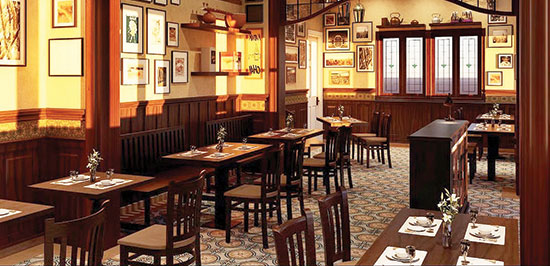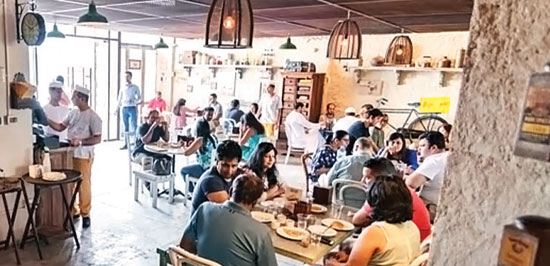IN a region known for its luxury dining and global-format food chains, one home-grown café is rewriting the playbook. Raju Omlet, a compact restaurant chain in the United Arab Emirates centred on one ingredient – eggs – has now earned the distinction of being the subject of a business-school case study at Harvard Business Review. What began as a father-son venture, is now a story about focus, design and expansion in a crowded market.
Founded about a decade ago by Rajiv Meherish and his son Nakul, Raju Omlet opened its first outlet in Dubai’s Karama neighbourhood. The concept was simple: Indian streetstyle egg dishes combined with affordable chai, served in a quirky environment brimming with nostalgia. That simple ‘one-ingredient’ bet might have felt limiting, but the brand turned it into a strength.
A Dubai restaurant turns an egg into an empire, and a case study

The academic attention came soon afterwards. Raju Omlet was featured in a case study published by Harvard Business Publishing, titled ‘Raju Omlet: Expand the menu’. It looked at the central question: can a restaurant with a narrow menu of egg preparations scale in a fast-moving and highly competitive market?
Ample variation
What underpins Raju Omlet’s story is not merely the fact it focused on eggs – but that it then found ample variation within this constraint. Nakul explains that the original menu of 11 dishes has grown to more than 60. A ‘power omelette’ caters to the fitnessminded; a ‘gravy omelette’ gives traditional curry-style flavours; and the chai comes in strong, masala, mint, cardamom, and ginger variants.
Dishes are paired with pavs or parathas, and prices intentionally remain accessible (roughly Dh10– Dh22 for eggs, Dh4.50 for a tea). The brand’s ambience – with antique frames, reclaimed railway sleepers for signage and odd-angle wall-hang ings – conveys a lived-in, street-café atmosphere.
Then came a moment of visual inspiration that sharpened the brand’s expansion narrative. During a two-day official visit to India in April, Sheikh Hamdan bin Mohammed bin Rashid Al Maktoum, Crown Prince of Dubai, dined at Pali Bhavan in Mumbai’s Bandra West – a space famed for its vintage décor and Indian comfort food. This visit caught the attention of Rajiv Meherish, who visited Pali Bhavan soon after and recognised its aesthetic potential.
Upcoming outlets
Rajiv commissioned Pali Bhavan’s interior designer Tejal Mathur to work on Raju Omlet’s upcoming outlets, including ones at World Trade Centre Mall in Abu Dhabi and Abu Shagarah in Sharjah.
Tejal describes the brief as creating a space that “cocoons patrons in an ambience that feels like it’s out of a sepia-toned photo album.” Each city, she adds, has its rhythm; the idea is to create a space that resonates locally while retaining the familiar, lived-in feel. Through this design pivot, Raju Omlet doubled down on sensory experience: food remains simple, but the environment becomes a signal.
From Karama to Al Quoz in Dubai, and now Sharjah and Abu Dhabi, Raju Omlet has grown beyond its initial footprint. While the chain’s core menu remains narrow, its brand expansion has not been tentative – it has aimed for repeat visits over one-time events, low ticket size over premium pricing, and atmosphere over novelty glitz. This is the sort of operational story educators dissect: How do you build a scalable model on modest unit economics? How do you preserve brand meaning as you grow?
Tight but innovative
For food-sector operators, the lesson is clear: often, the most durable advantages lie not in adding more and more items but in owning a single thing and doing it repeatedly well. Raju Omlet’s journey shows that you can keep your offering tight, but innovate within the constraint, stretch your format thoughtfully, and make your brand experience memorable.
For designers and brand builders, it underscores that space and story carry just as much weight as taste.
The Harvard case remains popular in MBA programmes for the very reason that it forces the question: “Do you chase menu breadth, or deepen meaning?” Raju Omlet chose the latter. And now, as the chain opens its eighth and ninth UAE outlets under a more curated design vision inspired by royal taste and street-café legacy, the question becomes: Can the feeling scale as well as the food has? In other words: the egg was the entry point. The story is the meal.



